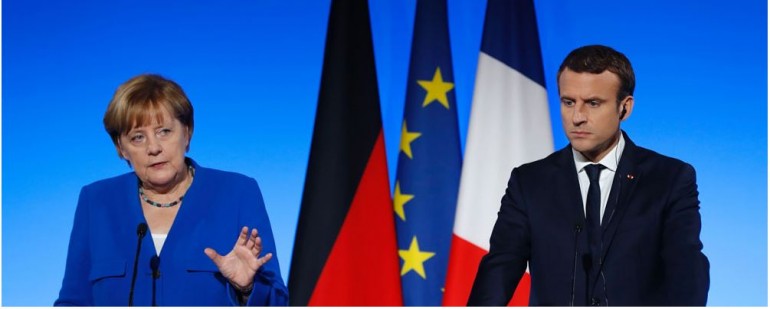From the French point of view, the upcoming federal election in Germany is essentially the second stage of a process that began with the election of President Emmanuel Macron in May. There is little doubt on the French side about the outcome of the German vote. Angela Merkel’s widely expected confirmation as Chancellor is seen as an added boost to the new positive spirit that has been observed since May between Paris and Berlin. For the French leadership, Merkel’s reelection also promises a genuine incitement to relaunch the European Union—something that Macron has been promoting since he became president.
This is not to say that the French government is ignoring its own obligations on the reform front. Early on, and before his own electoral success, Macron understood the political deal in-the-making between a strong French commitment to national reform and an equally firm engagement from Germany for more European integration. Within the first months of his presidential mandate, Macron has lost no time implementing his side of the bargain. His comprehensive—and sometimes provocative—agenda for economic and social change has been a kind of shock therapy on the French population. But Macron has also sent a clear message to Berlin about his determination to change the present course of the French economy and bring it back to parity with Germany’s. More specifically, the immediate launch of labor market reforms this summer was meant as a clear indication to Berlin about the seriousness of the new French government, in contrast to the procrastination so often experienced in the past.
When the German election is over, France will expect the same strong commitment from Berlin, this time in favor of European integration. For France, the 2017 elections on both sides of the Rhine are two faces of the same coin. They were the preconditions for making any significant moves toward more European ambition after the shock of the Brexit vote. From the French perspective, the political scene is now set for the EU to move ahead speedily.
Yet, with the electoral season over in both countries, the impression of common determination and mutual trust recently perceived in Berlin and Paris could soon face a hard reality check. And the wishful thinking also observed in both capitals may gradually give way to a more realistic assessment. Berlin could discover that attempts to overhaul the economy in France traditionally stir strong opposition from all sectors of society and may require a more gradual approach than what Germany is anticipating. As for French expectations on Europe, these could confront Germany’s more limited ambitions once the two partners start working on the vision—and the details—of substantial EU reform.
For those who have been observing the European debate in France and Germany, none of this will come as a complete surprise. It has been obvious for some time that political leaders in Berlin and Paris have been referring to the same concepts—such as permanent structured defense cooperationor the consolidation of the eurozone—but with quite different ideas about the substance. As discussions unfold between the two sides in the aftermath of this year’s electoral season, renewed Franco-German collaboration will need less superficial dialogue than has been exchanged in recent months. It will require some deep thinking about the kind of future that Berlin and Paris envisage for Europe ; how much flexibility they are ready to inject into existing EU institutions ; which partners they can set up coalitions with to promote their common idea of progress ; and what type of process should be favored within the EU to work on the definition and preparation of this reform effort. In other words, the two partners need to find out whether they share the same vision and the same working method as they try to promote more European integration.
This clarification will not come without risk. Differences will emerge and may hinder the renewed momentum between Berlin and Paris. Both partners are well aware of the difficulties to come. They know that the postelection phase will require a better understanding of where they both intend to go. There will be pressure on both sides to take the lead and impose its own views. While the new coalition in Berlin will need some time to be shaped, Germany’s French counterparts will probably keep the pressure up in order to place as many of their own ideas on the European program.
This scenario is not new. It is the traditional way of functioning for the French-German tandem. While differing points of view are common stock in this partnership, its greatest asset has always been the capacity of both nations to overcome their differences and pull a positive force out of divergences. If the EU is genuinely committed to becoming a serious player in the new world order, hard choices will need to be made. French and German leaders share a responsibility to bridge their differences to guide Europe forward. For both, this will be biggest the challenge in the months ahead.


